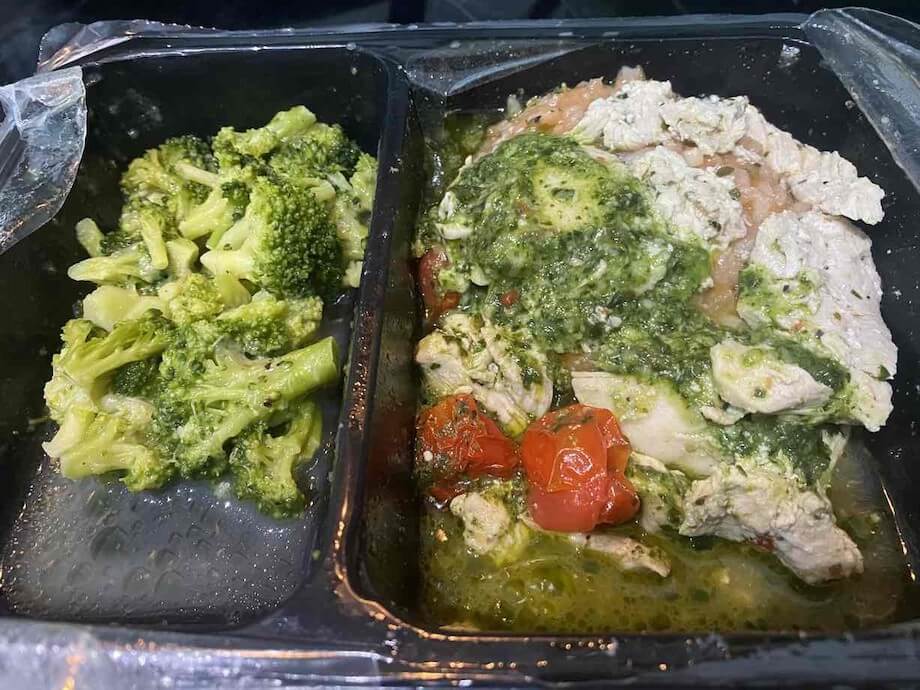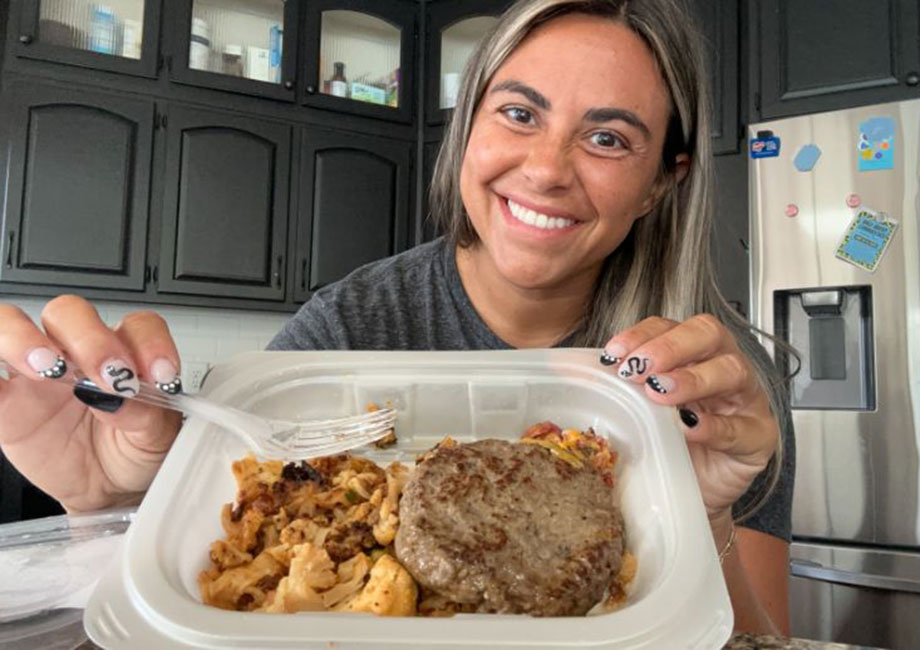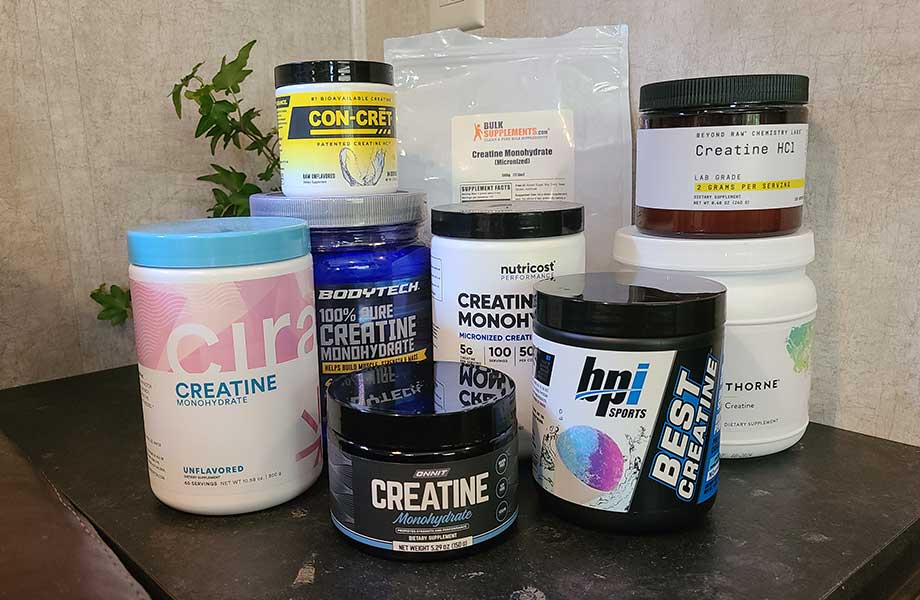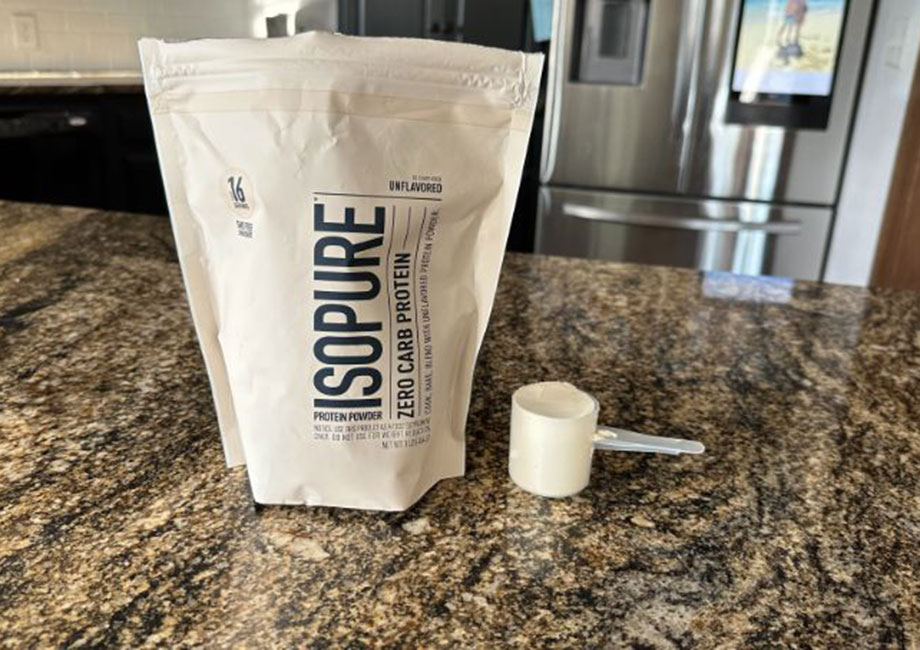Crowned the “Best Fast Weight-Loss Diet,” I can’t blame dieters for being drawn to the keto diet. And boy, are they drawn. The ketogenic diet1 was the most Googled diet in the United States, collecting over 25 million unique searches in 2020. Based on a 2020 US News Report, 70% of keto dieters chose to follow it based on their “own research,” while less than 5% say it was because a registered dietitian recommended it to them.
As a registered dietitian (RD) myself, I use this data to underscore the urgency and importance of accurately addressing, “What is the keto diet?” So before buying into a high-fat diet and investing in the best keto protein powders, let’s ensure you know the facts.
Medical disclaimer: This article is intended for educational and informational purposes only. It is not intended as a substitute for medical advice. For health advice, contact a licensed healthcare provider.
What is a Ketogenic Diet?
Also known as keto, a ketogenic diet is a very low-carbohydrate, high-fat, moderate-protein2 diet. The ketogenic diet comes in several versions with varying macronutrient breakdowns and protocols3, including:
- Standard ketogenic diet (SKD): Provides about 70% fat, 20% protein, and 10% carbs.
- Cyclical ketogenic diet (CKD): Cycles through five keto days followed by two high-carb days.
- Targeted ketogenic diet (TKD): Allows additional carbohydrates around workout sessions.
- High-protein ketogenic diet (HPKD): Offers higher protein intake than SKD and contains 60% fat, 35% protein, and 5% carbs.
Our focus will be the standard ketogenic diet (SKD), the most researched version. The table below compares it to the 2020-2025 Dietary Guidelines for Americans (DGAs), showing a macronutrient breakdown for a 2,000-calorie diet.

2020-2025 DGAs:
- Carbs: 45-65% daily amount, 225-325 grams/day
- Protein: 10-35% daily amount, 50-175 grams/day
- Fat: 20-35% daily amount, 44-78 grams/day
Standard Keto Diet:
- Carbs: 10% daily amount, 50 grams/day
- Protein: 20% daily amount, 100 grams/day
- Fat: 70% daily amount, 156 grams/day
So, why go against the grain (literally) and dramatically cut carbs and increase fat? It traces back to 1921 in the name of ketosis.
What is Ketosis?
The primary goal of following a ketogenic diet is to achieve ketosis, a metabolic state where the body uses ketones (produced from fatty acids) as its main source of energy.3
Imagine ketosis as a backup energy system: When the body has a regular supply of carbohydrates, typically over 50 grams daily, it converts these carbs into glucose as its preferred fuel source. Without carb intake and once glycogen reserves are depleted, the liver converts fats into ketones or ketone bodies typically within three to four days.
The metabolic process of ketosis dates back to 1911 when doctors used starvation to reduce epilepsy seizures1. A decade later, they discovered ketosis via a low-carb diet could achieve similar results.
Advancements in epilepsy treatment quieted the keto diet, although it resurfaced in the 1970s due to weight loss research by Dr. Robert Atkins. You guessed it, Dr. Atkins is the founding physician of the controversial low-carb Atkins diet.
RELATED: Weird Diets
Yet, the question remains: who is the keto diet truly suitable for?
Who Should Eat a Keto Diet?
As a therapeutic diet, the keto diet has been studied4 for its potential benefits for following health conditions:
- Epilepsy, particularly if resistant to medications
- Type 2 diabetes
- Insulin resistance, a pre-diabetic state
- Class III obesity, classified by a body mass index greater than 40
- Alzheimer’s disease and dementia5
- Autism6
However, these groups are not required to follow a keto diet, and individuals without these conditions may also consider trying it. The key is to find a dietary approach that works best for you, ideally guided by a nutrition expert like a certified dietitian.
Health Benefits of Keto Diet
From playing a role in weight loss to disease prevention, here are the potential health benefits of the keto diet.
May Aid Weight Loss
The keto diet can prompt quick weight loss initially, mostly from water loss after the body depletes its glycogen (stored glucose), likely earning its reputation as the “Best Fast Weight-Loss Diet.” The high-fat diet may also regulate appetite, helping to reduce calorie intake and aid weight loss.

Over time, however, the weight loss benefits of keto diminish, and 2021 research7 supports plant-based, low-fat diets as more effective for controlling appetite and lowering body fat. Adherence (or the ability to stick to the diet) also drops, although alternating between a keto and Mediterranean diet might offer a mix of immediate and sustainable weight loss.
TL;DR: Keto may help you quickly drop body weight (primarily as water weight), but a balanced approach is likely better for long-term weight loss.
RELATED: Best Weight Loss Programs
May Control Blood Sugars
Recent research8 shows that a low-carb, high-fat ketogenic diet can improve glycemic control, keeping blood sugars in optimal ranges, in overweight type 2 diabetics. Improvements in glycated hemoglobin (HbA1c), which reflects the average blood sugar over two to three months, are most notable.
May Improve Blood Lipids
Blood lipids9, like triglycerides and cholesterol, are crucial for maintaining cardiovascular health. Multiple studies10 suggest adopting a ketogenic diet can lead to a more favorable blood lipid profile, specifically reducing triglycerides and increasing HDL (the “good”) cholesterol levels.
However, a ketogenic diet might also increase levels of low-density lipoproteins (LDL), known as the “bad” cholesterol. High levels of LDL can cause plaque buildup in arteries, leading to heart disease.
May Prevent Certain Diseases
Some evidence2 supports potential benefits in reducing the risk of certain diseases and conditions, including:
- Type 2 diabetes
- Hyperlipidemia (high blood lipids)
- Cardiovascular (heart) disease
- Cancer
- Alzheimer’s disease
Keto Diet: Potential Side Effects
Current research7 suggests that the risks outweigh the benefits for most individuals, but it’s essential to address case-by-case. Here’s what to know about keto’s potential side effects and risks.
Short-Term Keto Side Effects
Transitioning into ketosis may cause the “keto flu” and cause short-term side effects, including:2
- Nausea and vomiting
- Headache
- Fatigue
- Dizziness
- Insomnia
- Reduced exercise tolerance
- Constipation
The keto flu should resolve within a few days to weeks, and ensuring adequate fluids and electrolytes can ease symptoms.

RELATED: Best Electrolyte Drink
Long-Term Risks of Keto
Although data is somewhat limited, emerging evidence highlights noteworthy long-term health implications:10
- Nutrient deficiencies like fiber, folate, calcium, potassium, and vitamins A, E, and B6
- Digestive issues such as constipation, diarrhea, and bloating
- Kidney stones
- Muscle breakdown and loss, especially if weight loss is rapid
- Cognitive decline
- Health disease risks, including cardiovascular disease and cancer
Remember, some dietary benefits double as risks. While the keto diet may improve HDL cholesterol, it can also increase LDL, a risk factor for heart disease.
Ketoacidosis: A Serious Danger
While ketosis is typically safe, ketoacidosis is a different and dangerous condition where ketone bodies reach toxic blood levels11. It primarily affects individuals with type 1 diabetes, but it can occur when following a prolonged, very low-carb diet in rare instances.
Always seek advice from a healthcare provider before making significant dietary changes.
Foods To Eat On a Keto Diet
A keto eating plan focuses on high-fat oils, animal proteins, non-starchy vegetables, and select nuts, seeds, dairy products, and fruits.
RELATED: Best Keto Meal Delivery Service
Fats and Oils
To meet the high-fat requirement, a keto meal plan is rich in fats and oils like:
- Avocado oil
- Butter
- Canola oil
- Coconut oil
- Ghee
- Olive oil
Nuts and Seeds
Nuts and seeds are rich in healthy fats, although some are lower in carbs than others, including:
- Almonds
- Flax seeds
- Macadamia nuts
- Pecans
- Pumpkin seeds
- Sunflower seeds
- Walnuts

Animal-Based Protein
The different types of protein are primarily categorized as animal and plant-based. However, since plant proteins often contain higher carb content, a keto diet prioritizes animal proteins such as:
- Meat and poultry, like beef, bison, chicken, pork, and turkey
- Fatty fish and seafood, including mackerel, salmon, shrimp, trout, and tuna
- Eggs, preferably with the yolk for added fat and nutrients
Expert tip: Opt for grass-fed, pasture-raised, wild-caught, and cage-free varieties.
Non-Starchy Vegetables
Low in carbohydrates, most non-starchy veggies are included in a keto diet:
- Asparagus
- Bell peppers
- Broccoli
- Cauliflower
- Cucumber
- Leafy greens (like spinach and kale)
- Onions
- Mushrooms
- Zucchini

Low-Carb Fruits
Although limited, most berries and select fruits can be enjoyed on a keto diet:
- Avocados
- Blueberries
- Coconuts
- Raspberries
- Strawberries
- Tomatoes
Low-Carb Dairy and Alternatives
Dairy products can be high in added sugars and the natural sugar lactose, particularly in forms like low-fat milk and yogurts. Higher-fat and lower-carb dairy options are more keto-friendly, including:
- Full-fat dairy milk, cream cheese, and yogurt
- Hard cheeses (like cheddar and Swiss)
- Heavy cream
- Some unsweetened plant-based milk (such as cashew and almond milk)
- Whey protein isolates
Other
Additional permitted keto-friendly foods:
- Bone broth
- Dark chocolate (cocoa 90% or higher)
- Cocoa powder
- Herbs and spices
- Shirataki noodles
- Unsweetened condiments, including mustard and vinegar
- Unsweetened beverages like coffee and tea

Foods to Avoid on a Keto Diet
Some high-carb foods can fit into a keto meal plan depending on your personal carb limits and portion sizes. However, most keto followers tend to avoid carb-dense foods, including, but not limited to, the foods listed below.
Whole Grains, Refined Grains, and Related Products
- Couscous
- Oats
- Quinoa
- Rice
- Wheat
- Grain-based products, including beer, bread, breakfast cereals, crackers, and pasta
Starchy Vegetables
- Corn
- Peas
- Potatoes
- Winter squash
Sugars and Sweeteners
- Agave
- Honey
- Refined sugars like white and brown sugars
- Syrups, including fruit and maple syrups
- Sugary products such as candy, cake, and cookies
High-Sugar Fruits
- Bananas
- Fruit juices
- Dried fruits like raisins
- Mangoes
- Pineapples
Legumes
- Beans
- Lentils
- Peas
Is a Keto Diet Healthy?
Although “healthy” is subjective and varies from person to person, we can objectively compare the keto diet with evidence-based components that help define a healthy diet.12

Similarities Between a Keto and a Generalized Healthy Diet
- Promotes healthy fats like olive oil and fish
- Limits added sugars
- Encourages vegetables (albeit mainly non-starchy for keto)
- Reduces (or avoids) alcohol intake
Differences and Potential Concerns of the Keto Diet
- Restriction of nutrient-dense foods: Keto restricts various nutrient-dense foods typically encouraged in a generalized healthy diet, including whole grains, most fruits, and starches.
- Promotion of animal proteins: Keto mainly promotes animal proteins, which can be rich in saturated fats. In contrast, a generalized healthy diet emphasizes varying lean proteins (mainly from plants) and limits animal-derived proteins, especially fatty and processed meats.
- Sustainability concerns: The keto diet can be challenging to maintain due to its restrictive nature.
What is the Keto Diet? Final Thoughts
The keto diet is a high-fat, moderate-protein, and very low-carbohydrate diet. Although initially developed in the early 1920s for epilepsy treatment, it became 2020’s most searched diet.
The keto diet continues to gain popularity for various health and weight loss goals, so it’s essential you know the facts:
- Primarily therapeutic: Mostly recommended for managing epilepsy, obesity, type 2 diabetes, and other health conditions.
- Weight loss: Often leads to initial and temporary water weight loss rather than long-term fat loss.
- Health conditions: Improvements in blood sugars and lipids don’t appear significantly better than other diets after one year.
- Risks and limitations: Long-term research is limited, but the keto diet may increase the risk of nutrient deficiencies, kidney stones, digestive distress, and more.
- Adherence difficulty: High drop-out rates, likely related to excluding high-carb foods and meticulously tracking food intake.
As you wrap up your “What is the keto diet?” search, consider your motivation and if a high-fat diet plan is sustainable before embarking on the keto journey.
Another way to think of this? Just because you read that running is an excellent aerobic exercise doesn’t mean it’s the best and only way to improve cardiovascular fitness. And if you cringe at running but swoon over biking, your enjoyable path to cardiovascular health is clear. Selecting a sustainable and nourishing diet should be no different.
What is the Keto Diet? FAQs
What foods do you eat on a keto diet?
Keto-friendly foods ensure you’re meeting high-fat, low-carb, and moderate-protein targets, including:
– Healthy oils such as olive oil
– Meat, poultry, and eggs
– Fish and seafood
– Non-starchy vegetables
– Nuts and seeds
– Low-sugar fruits
– High-fat, low-carb dairy products
What are the basic rules for keto?
Consume high amounts of fat, moderate protein, and limit carbohydrate intake to 50 grams or less daily to sustain ketosis.
What does the keto diet consist of?
The keto diet primarily consists of high-fat, low-carb foods like oils, meats, poultry, eggs, non-starchy vegetables, and low-carb fruits like berries.
Is a keto diet really healthy?
The keto diet emphasizes healthy fats, red meats, poultry, non-starchy vegetables, and other nutrient-rich foods. Yet, it omits vital foods commonly associated with a healthy diet12, such as whole grains, plant-based proteins, and high-carbohydrate fruits and vegetables. While the keto diet can be a beneficial dietary therapy for some people, including those with epilepsy, it’s generally unsustainable and may pose some health risks.
These statements have not been evaluated by the Food and Drug Administration. This product is not intended to diagnose, treat, cure, or prevent any diseases.
References
- McGaugh E, Barthel B. A Review of Ketogenic Diet and Lifestyle. Mo Med. 2022;119(1):84-88.
- Masood W, Annamaraju P, Khan Suheb MZ, et al. Ketogenic Diet. [Updated 2023 Jun 16]. In: StatPearls [Internet]. Treasure Island (FL): StatPearls Publishing; 2023 Jan-. Available from: https://www.ncbi.nlm.nih.gov/books/NBK499830/
- Shilpa J, Mohan V. Ketogenic diets: Boon or bane?. Indian J Med Res. 2018;148(3):251-253. doi:10.4103/ijmr.IJMR_1666_18
- Crosby L, Davis B, Joshi S, Jardine M, Paul J, Neola M, Barnard ND. Ketogenic Diets and Chronic Disease: Weighing the Benefits Against the Risks. Front Nutr. 2021 Jul 16;8:702802. doi: 10.3389/fnut.2021.702802. PMID: 34336911; PMCID: PMC8322232.
- Davis JJ, Fournakis N, Ellison J. Ketogenic Diet for the Treatment and Prevention of Dementia: A Review. J Geriatr Psychiatry Neurol. 2021 Jan;34(1):3-10. doi: 10.1177/0891988720901785. Epub 2020 Jan 30. PMID: 31996078.
- Li Q, Liang J, Fu N, Han Y, Qin J. A Ketogenic Diet and the Treatment of Autism Spectrum Disorder. Front Pediatr. 2021 May 11;9:650624. doi: 10.3389/fped.2021.650624. PMID: 34046374; PMCID: PMC8146910.
- Crosby L, Davis B, Joshi S, et al. Ketogenic Diets and Chronic Disease: Weighing the Benefits Against the Risks. Front Nutr. 2021;8:702802. Published 2021 Jul 16. doi:10.3389/fnut.2021.702802
- Zhou C, Wang M, Liang J, et al. Ketogenic Diet Benefits to Weight Loss, Glycemic Control, and Lipid Profiles in Overweight Patients with Type 2 Diabetes Mellitus: A Meta-Analysis of Randomized Controlled Trails. Int J Environ Res Public Health. 2022 Aug 22;19(16):10429. doi: 10.3390/ijerph191610429. PMID: 36012064; PMCID: PMC9408028.
- Sugerman DT. Blood Lipids. JAMA. 2013;310(16):1751. doi:10.1001/jama.2013.280593
- Batch JT, Lamsal SP, Adkins M, et al. Advantages and Disadvantages of the Ketogenic Diet: A Review Article. Cureus. 2020;12(8):e9639. Published 2020 Aug 10. doi:10.7759/cureus.9639
- Ghimire P, Dhamoon AS. Ketoacidosis. [Updated 2023 Aug 8]. In: StatPearls [Internet]. Treasure Island (FL): StatPearls Publishing; 2023 Jan-. Available from: https://www.ncbi.nlm.nih.gov/books/NBK534848/
- Cena H, Calder PC. Defining a Healthy Diet: Evidence for The Role of Contemporary Dietary Patterns in Health and Disease. Nutrients. 2020;12(2):334. Published 2020 Jan 27. doi:10.3390/nu12020334






